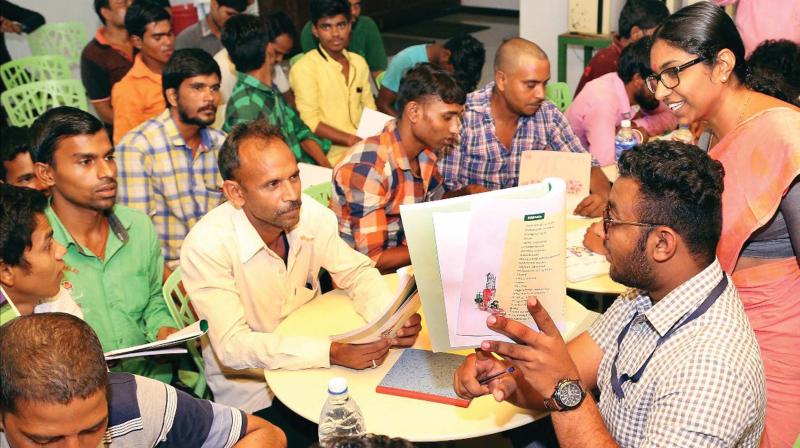The language friend

When 32-year-old Aseem landed in Kochi carrying the hopes of his family back in Patna, he had to face many challenges, the language being one. Then there was exploitation, lower wages and longer working hours than local labourers, life in squalor, illnesses with none to take care of… issues every migrant labourer would confront in Kerala. That most workers had no means to access social security measures and schemes, and that there was no trade union to support them, did not help either.
Language was a major impediment: the labourers from West Bengal, Assam, Uttar Pradesh, Bihar, Odisha and Tamil Nadu had little knowledge of Malayalam. This virtually kept them away from government offices which would have otherwise come to their aid on many occasions. The scenario is changing, finally. Thanks to Changathi, a project initiated by the Kerala State Literacy Mission. Changathi, is Kerala’s unique friendly Mission to teach Malayalam to workers from other states. The larger aim of the programme is to integrate the guest workers with the state’s culture so that they do not feel alienated here. They will be taught how to read and write in Malayalam so as to enable them to mingle more freely with the natives.
The project, which was started last year, has gained traction of late though it did not have many takers in the beginning. The realisation that a basic knowledge of the language of the land where they work would make their lives a lot more easy has many of them enrolling for the self-help classes. Changathi offers a two-hour class on every Sunday in makeshift school on the premises of the companies where they work, and the ‘students’ attend them in batches. The mission has been a great success in Ernakulam district’s Changathi centre in Perumbavoor municipality. As a result they are getting ready for the exams!
“The first few classes were very ineffective as they and their employers showed no interest. But somehow they understood the importance of these classes and started to attend it regularly,” says Jansi Martin, one of the coordinators of Suraksha Mission project, an outreach of Rajagiri College, which volunteers for the mission. Each class has at least 20 students, all aged between 18 and 35. There are almost 50 batches in Perumbavoor municipality alone. Mr Aseem is one of the beneficiaries of the project. “People used to cheat us…auto drivers, bus conductors and vendors of various services used to charge us extra. But since we started to speak Malayalam, things have changed a lot,” he said.
This is because they started to speak up, and even question others, said Ms Martin. “We taught them according to their needs. We taught them how to read boards, bus names, place cards, to talk to a bus conductor or an auto driver, how to ask for the balance, how to fill documents, how to ask for direction…” Changathi is a liberal programme. “Though we have a text book called Hamara Malayalam, the learners set the curriculum as the needs were different for different people. Someone would want to know the procedures in local markets while another needed service from institutions such as banks and post offices. For an educated man, these classes may look silly but for them, it really mattered,” said Ms Martin.
The enthusiasm the guest labourers have shown is remarkable, she said. “They seem craving for more, for some to teach them more. We knew this is becoming a success when they started asking us to teach a new thing each week: to teach something they experienced in that week. They have been very dedicated.” It was not easy to start the project. Language was a big hurdle for the teachers and the Literacy Mission volunteers, too. Sometimes they were not able to communicate well to the migrant workers. So they sought the help of some workers who could translate. “Boby, who hails from West Bengal, has been in Kerela for the last 20 years, and he helped us in translating from Bengali and Hindi. We then identified more people like him and sought their help,” said Ms Vanaja who works with the Literacy Mission. NGOs are volunteering to help the Literacy Mission implement the project. The teaching staff for the Mission includes teachers from MES College, Marampally, Aluva, along with the teachers from Rajagiri College and their outreach.
One of the drawbacks that the volunteers point out is that there are not many women in the classes. “But we are planning to launch a campaign to increase the number,” Ms Martin said. “We have some excellent students in our classes. Chandan Kumar, Deepak, Mukshidul...,“ Ms Martin named a few. “They are now preparing for an assessment examination in the second week of April.” The proof of the pudding is in its eating. “Many of our students have started benefitting from the classes,” said Ms Martin. “They have got salary hikes, better places to reside and are now left with more savings to send to their families back home. They are making the full use of the classes, which was our goal.” Now the volunteers are out to ensure that the project leaves out none. “There are many people who have still not joined the classes, Hopefully we will be able to reach out to them in future,” she said.

